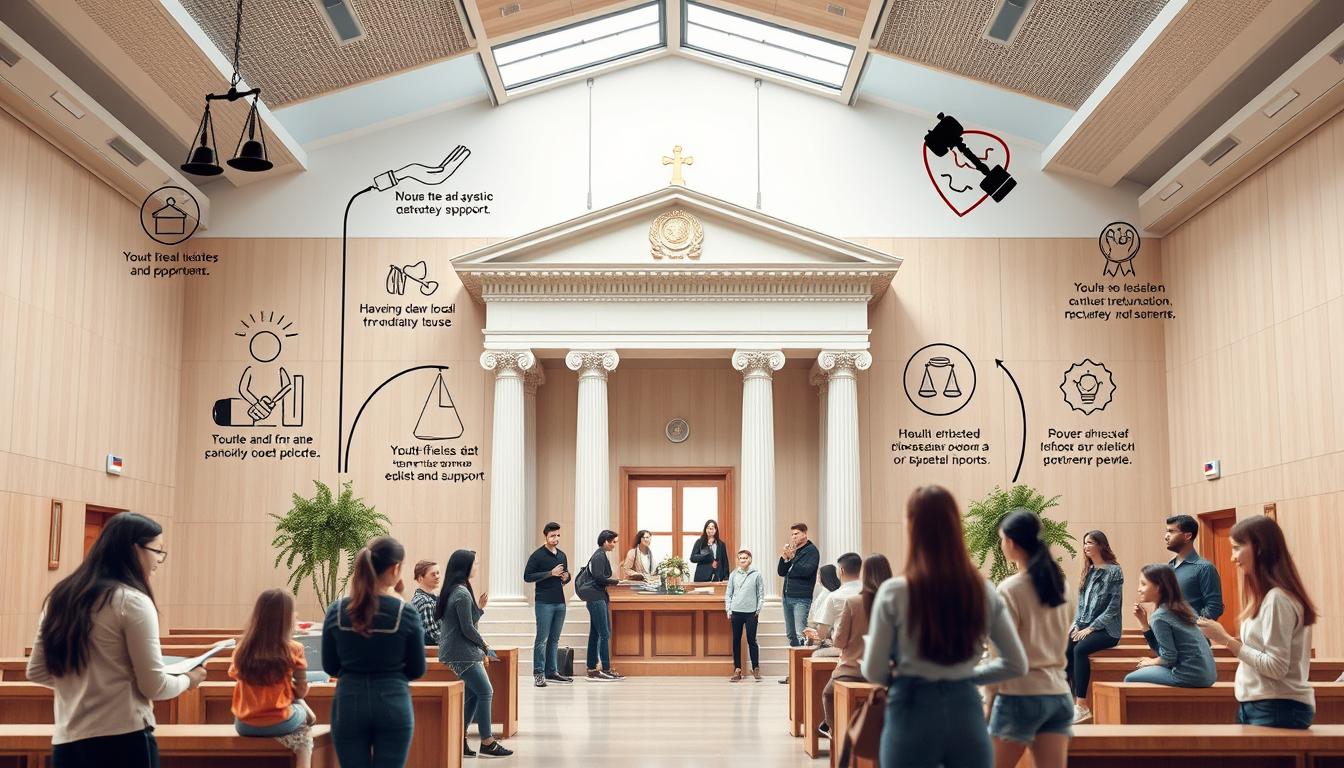Rights of Accused in Criminal Proceedings in Romania
Rights of Accused in Criminal Proceedings in Romania
What safeguards protect the accused in Romania’s criminal justice system?
This is a key question for those facing legal challenges here.
Romania’s criminal proceedings aim to uncover the truth, punish the guilty, and protect the innocent. Knowing your rights is crucial for navigating this complex system.
The Romanian criminal justice system is based on fairness and due process.
It ensures certain rights for the accused during the trial.
These legal protections help ensure justice is served while respecting individual liberties.
In Romania, criminal trials are conducted in Romanian. If you don’t speak the language, interpreters are provided.
The Criminal Procedure Code outlines the basic rules and actions in criminal trials. It includes principles like the disclosure of truth and the active role of judicial bodies.
Watch our new Podcast on the rights of defendants in Romanian Criminal Law:
Key Takeaways:
- Criminal proceedings in Romania aim to acknowledge crimes and ensure justice;
- The right to defense is guaranteed throughout the criminal trial;
- Criminal trials must lead to the disclosure of truth regarding the case;
- Accused persons must be treated with respect, with laws against torture;
- Civil action can be joined with criminal action in certain cases;
- The prosecutor may support civil action initiated by the harmed person;
- Romanian citizens abroad enjoy 100% protection of the Romanian State.
Introduction to Criminal Proceedings in Romania
The Romanian criminal justice system follows the Criminal Procedure Code.
This code outlines how criminal cases are handled.
It aims to make sure trials are fair and protect the rights of those accused.
Overview of the Romanian Criminal Justice System
Romania’s legal system combines civil law and European Union standards.
The criminal justice process has several steps, from investigation to trial.
Important roles are played by prosecutors, judges, and defense lawyers.
Importance of Understanding Accused Rights
It’s vital to know your rights if you’re accused in Romania.
These rights help prevent unfair treatment and ensure a fair trial.
They include the right to a lawyer and the assumption of innocence.
Key Legal Terms in Romanian Criminal Proceedings
Learning legal terms is key to understanding the Romanian criminal justice system.
Here are some important ones:
| Romanian Term | English Translation | Definition |
|---|---|---|
| Inculpare | Indictment | Formal accusation of a crime |
| Rechizitoriu | Indictment document | Official document detailing charges |
| Avocat | Lawyer | Legal representative for the accused |
| Procuror | Public prosecutor | State representative in criminal cases |
Knowing these terms helps you understand criminal proceedings in Romania better.
The system focuses on the presumption of innocence and your right to defense at all times.
Right to Be Informed of Charges
In Romania, knowing your rights is key when you face criminal charges.
You have the right to be told about the accusations against you quickly.
This right makes sure the justice system is fair and open.
The Romanian Criminal Procedure Code says you must know about the crime and charges before any questions.
This is a big part of the criminal process in Romania.
Police must give you this info in writing.
You must sign a document to show you understand your rights and the charges.
This helps protect your right to defend yourself and get ready for court.
| Right | Description |
|---|---|
| Immediate Notification | Suspects must be informed of charges before questioning |
| Written Information | Charges must be provided in writing |
| Language Consideration | Information must be in a language the accused understands |
| Confirmation | Accused must sign a document acknowledging receipt of information |
Knowing your rights in Romania is crucial for a fair trial.
The right to know about charges is just one of many protections.
These are guaranteed by Romanian law and international human rights.
Right to Legal Representation
In Romania, you have the right to legal help during criminal cases.
This right makes sure you’re treated fairly and defended well.
The country offers different ways to get legal help.
Access to Public Defenders
Public defenders, or “avocat din oficiu” in Romania, are picked by the bar association.
There’s one in each county and one in Bucharest.
These groups are part of the National Association of Romanian Bars.
Right to Choose Private Counsel
You can also choose your own lawyer.
This lets you pick someone you trust to look out for your interests.
It’s good if you have special legal needs or want a certain lawyer’s help.
Legal Aid in Criminal Cases
Legal aid is for those who can’t pay for a lawyer in criminal cases.
But, legal aid for civil cases works differently.
If you’re arrested, the police must tell you about your rights, including getting a Romanian lawyer.
You’ll sign a paper saying you know your rights.
If you’re not from Romania, you can tell your embassy or consulate you’re detained.
The courts must tell you about your right to a lawyer before you make a statement.
This is written down in the official report.
Presumption of Innocence
The presumption of innocence in Romania is a key part of fair trials.
It means that anyone accused of a crime is seen as innocent until proven guilty.
In Romania, this right is a big part of the legal system, protecting those accused of crimes.
Romania really values the presumption of innocence.
The Romanian Constitution says that people are innocent until proven guilty.
This follows international rules, like the European Convention on Human Rights and the International Covenant on Civil and Political Rights.
For those defending against criminal charges, knowing this principle is crucial.
It makes the prosecution prove guilt with strong evidence.
This helps avoid wrong convictions and makes sure trials are fair.
| Key Aspects of Presumption of Innocence in Romania | Description |
|---|---|
| Legal Basis | Romanian Constitution, Article 23 Point 8 |
| Burden of Proof | On the prosecution |
| Duration | Until final judgment of conviction |
| International Alignment | European Convention on Human Rights, EU Charter of Fundamental Rights |
The presumption of innocence in Romania goes beyond the courtroom.
It stops public officials from saying someone is guilty before a trial ends.
This keeps the justice system honest and protects the accused’s good name.
Rights of the Accused in Criminal Proceedings in Romania
In Romania, the rights of those accused in criminal cases are well-protected.
These rights follow international standards and ensure fairness in the justice system.
Constitutional Protections for the Accused
The Romanian Constitution protects the rights of those accused.
It ensures they are not arrested unfairly, have the right to a lawyer, and are considered innocent until proven guilty.
Specific Rights Guaranteed by Romanian Law
Romanian law gives several rights to those accused.
These include:
- The right to be informed of charges;
- Access to legal counsel;
- Protection against self-incrimination;
- The right to a fair and speedy trial.
International Standards and Romanian Compliance
Romania works to meet international human rights in its justice system.
Its laws and practices follow the European Convention on Human Rights and other global agreements.
| Right | Romanian Law | International Standard |
|---|---|---|
| Legal Representation | Guaranteed | Compliant |
| Fair Trial | Ensured | Compliant |
| Protection Against Torture | Prohibited | Compliant |
Right to Remain Silent and Protection Against Self-Incrimination
In Romania, the right to silence and protection against self-incrimination are key legal rights.
These rights help ensure that people accused of crimes don’t have to give evidence against themselves.
The Romanian legal system values these rights a lot, just like the Miranda rights in other places.
If you’re charged with a crime in Romania, the police must tell you about your right to silence before you say anything.
You can decide not to answer questions or give information that could make you look guilty.
Remember, your silence can’t be used as proof of guilt in court.
The European Court of Human Rights has made important decisions about these rights.
For example, in Funke v. France, the court said it’s wrong to punish someone for not talking without enough evidence for a crime.
| Case | Key Finding |
|---|---|
| Murray v. United Kingdom | No violation for remaining silent, but condemned denial of access to a lawyer |
| Saunders v. United Kingdom | Statements obtained under duress cannot incriminate the accused during trial |
| Condron v. United Kingdom | Interpretation of silence as incriminating evidence challenged fair trial rights |
Romania has made its legal system stronger since 1989, especially in these areas.
The country follows international standards to make sure accused people are treated fairly in court.
Right to a Fair and Speedy Trial
In Romania, the right to a fair trial is key in the criminal justice system.
Article 47 highlights the need for a fair and public hearing.
It must happen within a reasonable time by an independent and impartial tribunal.
This meets international standards and ensures fairness.
Time Limits in Criminal Proceedings
Speedy trials are important in Romania’s legal system.
The Criminal Procedure Code has specific time limits for each stage of criminal proceedings.
This helps ensure justice is served quickly and avoids delays.
For example, cases of alleged police abuse of Roma took nearly four years on average, the European Court of Human Rights found.
Ensuring Judicial Impartiality
Judicial impartiality is upheld through strict laws and ethical standards for judges.
In 2018, 633 complaints against penitentiary staff were filed for abuses of inmates’ rights and mistreatment.
Judges accepted 317 of these complaints, showing their dedication to fairness.
Public Hearings and Exceptions
Public hearings are common in Romania’s criminal trials, promoting openness.
Exceptions are made for cases involving minors or national security.
The accused has the right to be present and participate in their trial.
Bulgarian law, similar to Romania’s, emphasizes this right in Article 55 of their Code of Criminal Procedure.
| Year | Complaints Filed | Complaints Admitted |
|---|---|---|
| 2018 | 633 | 317 |
| 2017 | Not Available | 506 |
Right to Present Evidence and Cross-Examine Witnesses
In Romania, the right to present evidence and cross-examine witnesses is key in criminal cases.
The Criminal Procedure Code lets accused people defend themselves.
They can call witnesses, submit documents, and question the prosecution’s evidence.
Cross-examination rights in Romania meet European standards.
The European Court of Human Rights respects different evidence systems.
Your right to question witnesses ensures a fair trial in Romanian courts.
Witness testimony is crucial in criminal cases.
Romanian law lets you present your own witnesses and question the prosecution’s.
This balance ensures all facts are heard by the court.
The court focuses on following European Human Rights guarantees in evidence collection.
If you can’t attend your trial, there are protections.
EU Directive 2016/343 requires Romania to inform you of trial dates and consequences of missing it.
In some cases, you might get a new trial if you weren’t there.
These rules protect your rights and ensure a fair trial in Romania.
FAQ
What is the purpose of criminal proceedings in Romania?
In Romania, criminal trials aim to acknowledge and punish crimes.
They also protect the innocent.
This helps uphold the law, individual rights, and freedoms.
What language are criminal trials conducted in Romania?
Trials in Romania are in Romanian language.
But, interpreters help those who don’t speak Romanian.
What guarantees the presumption of innocence in Romanian criminal proceedings?
Article 52 of the Criminal Procedure Code ensures it.
It says anyone is innocent until proven guilty by a court.
What rights do accused persons have regarding legal representation in Romania?
Accused in Romania can choose a lawyer or get a public defender.
Legal aid is for those who can’t afford a lawyer in Romania.
What protections against self-incrimination exist in Romanian criminal proceedings?
Romanian law protects against self-incrimination.
You can’t be forced to testify against yourself.
Silence can’t be seen as proof of guilt.
How does Romanian law ensure a fair and speedy trial?
Romanian law promises a fair and quick trial.
The Criminal Procedure Code sets time limits.
It also ensures judges are impartial.
What rights do accused persons have regarding evidence and witnesses in Romanian criminal trials?
In Romania, accused can defend themselves with evidence and question witnesses.
They can also call their own witnesses and challenge the prosecution’s evidence.
What are the fundamental rights of an accused person in Romania’s criminal proceedings?
In Romania, an accused person has several fundamental rights during criminal proceedings.
These include the right to be presumed innocent until proven guilty, the right to remain silent, the right to legal representation, the right to be informed of the charges against them, and the right to a fair trial.
These rights are enshrined in the Romanian Constitution and the Criminal Procedure Code, aligning with European standards and international human rights conventions.
The accused also has the right to appeal decisions made during the proceedings and to request the exclusion of illegally obtained evidence.
How does the right to legal representation work in Romanian criminal proceedings?
The right to legal representation is a fundamental aspect of Romania’s criminal justice system.
Every accused person has the right to choose their own lawyer or have one appointed by the state if they cannot afford one.
This right applies from the moment a person becomes a suspect or is accused of a crime.
Our team of lawyers in Romania can be present during interrogations, investigations, and throughout the entire trial process.
If the case involves a serious offense or if the accused is a minor, legal representation is mandatory.







